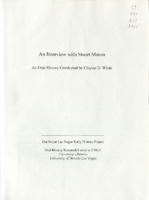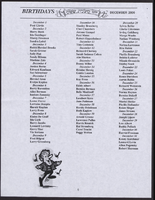Search the Special Collections and Archives Portal
Search Results

Book, The Marshall Plan, by Jack Sheehan, 2013
Date
Description
Art Marshall is one of the founders of the Marshall-Rousso chain of women's dress shops that started in casinos in Las Vegas. He is also a banker, a member of the Nevada Gaming Commission, is active in the Anti-Defamation League and the Jewish Federation of Las Vegas, is an art collector, and is a philanthopist, especially for Jewish faith-based causes and for the University of Nevada, Las Vegas.
Text

Interview with Leslie Ray Hill, February 17, 2006
Date
Archival Collection
Description
Text

Interview with Lewis Gibson Miller, September 14, 2005
Date
Archival Collection
Description
Text

Transcript of interview with Sonja Saltman by Barbara Tabach, August 18, 2015
Date
Archival Collection
Description
Included in this oral history are reminiscences of Sonja Saltman's personal non-Jewish heritage in Austria, the importance of her grandmother in her life, and how she recalls becoming part of the Jewish community.
Sonja Saltman is a psychologist and philanthropist in Las Vegas, Nevada. She is executive director and co-founder of the Existential Humanistic Institute, a non-profit organization based in San Francisco, California that offers training in existential-humanistic therapy and theory. In 2003 Sonja and her husband Michael Saltman founded the Saltman Center for Conflict Resolution at the University of Nevada, Las Vegas (UNLV) William S. Boyd School of Law. The Saltman Center is focused on research, teaching, and public service related to "the advanced study of the nature of conflict and how to resolve it." A native of Austria, Sonja Saltman also serves as the Honorary Consul for Austria in Las Vegas. The Saltmans are involved with multiple charitable organizations and initiatives, both locally and abroad. Sonja Saltman has served on the boards of the Anti-Defamation League, Nevada Women's Philanthropy, and the Black Mountain Institute. Projects that the couple has supported include the rebuilding of homes and bridges is Bosnia, and Streetball Hafla, a basketball program to improve relations between Jewish and Arab teenagers in Israel. In 2014 Sonja and Michael Saltman were recognized as Distinguished Nevadans by the Nevada System of Higher Education. Included in this oral history are reminiscences of her personal non-Jewish heritage in Austrian, the importance of her grandmother in her life, and how she recalls becoming part of the Jewish community.
Text

Transcript of interview with Jerry Engel by Barbara Tabach, March 1, 2016
Date
Archival Collection
Description
Jerry Engel was born in 1930 in New Jersey and spent most of his early life in Long Beach, New York until the family moved westward to Las Angeles. Jerry is a retired Certified Public Accountant and loves to talk about the history of Las Vegas that he observed since arriving in 1953. That was the year that he moved to Las Vegas to join his older brothers, Morris and Phil, in their accounting firm. Their major client at the time was Desert Inn. Another personal connection with local history: the Engel brothers? mother, Esther Katz Engel, was among the early investors in the Moulin Rouge hotel/casino enterprise. Jerry graduated with honors from University of California, Los Angeles in 1951. His accounting career in Las Vegas is highly regarded and he continues to maintain a consulting practice. He remains active within the community and enjoys doing presentations based on his memories of Las Vegas history. Within this interview, Jerry highlights people, casinos and other observations of local history that he came into contact with over the decades. He provides insights about the role of an accountant in the gaming industry. He also discusses the influence of Jewish business leaders in and array of local gaming and non-gaming issues, including the retail world, Jim Crow era segregation, and the astonishing growth of the valley over six decades.
Text

Transcript of interview with Glenn Tredwell by Barbara Tabach, March 4, 2016 and April 14, 2016
Date
Archival Collection
Description
In this interview Glenn Tredwell talks about his business ventures since moving to Las Vegas in 1976. He is able to address the many nuances of technology on the global gaming industry.
Text

Transcript of interview with Jean Tobman, Marilyn Moran and Janie Moore by Claytee D. White, November 5, 2013
Date
Archival Collection
Description
Interview with Jean Tobman and two of her daughters, Marilyn (Tobman) Moran and Janie (Tobman) Moore by Claytee White, November 5, 2013. In this interview, Jean Tobman recalls coming to Las Vegas with her husband and two young children in the 1950s, and the life they established in the Pinto area of the Westside. Her husband, Herb, owned City Furniture and a cab company near downtown. Marilyn and Janie discuss their youth and the enjoyable time they had growing up in Las Vegas. Marilyn talks about how the city has grown and her time on the planning commission. Janie also discusses the growth of Las Vegas and her nostalgia for old Las Vegas.
In 1953, Jean and Herb Tobman moved from New Jersey to Las Vegas. The Tombans settled in the Pinto Palamino. Upon moving, Jean initially assisted her mother at her rooming house, and Herb worked with Jean's father at City Furniture. Herb bought his first cab soon thereafter, and grew one vehicle into Western Cab Company, which is still family-run. After a large fire closed City Furniture, Herb worked as the general manager at Moulin Rouge, jumpstarting his career in the gaming industry. Marilyn, Janie and Helen are the children of Jean and Herb and all still live in Las Vegas. The girls grew up keeping horses, as did many other neighbors in the Pinto area. Marilyn married John Moran, the sheriff's son, who served as a police officer himself. She sat on the planning commission for a decade, during the city's growth spurt. Janie spent a semester at Arizona State University before returning to Las Vegas to work at Stardust Hotel, a property co-owned by her father, who also served as the its president.
Text

Transcript of interview with Milton I. Schwartz by Claytee White, May 4, 2004
Date
Archival Collection
Description
In this interview, Milton Schwartz discusses his life in Las Vegas and his business investments. He worked at the Flamingo Hotel right after World War II, and he started Valley Hospital as an investor in 1970. Schwartz has a Hebrew academy named after him in Israel, and owned the Yellow-Checker-Star Cab Company. He was active in the Republican Party.
Milton I. Schwartz was born and raised in Brooklyn, New York. He enlisted in the Army the day after Pearl Harbor (age 20) and did a five year stint in the Pacific as a repeater specialist. After the war he returned to his job as a refrigeration mechanic in Brooklyn and was soon offered a job out in Las Vegas at the Flamingo Hotel, which was owned by Bugsy Siegel. After three months in Las Vegas, during which time he had several conversations over dinner with Beldon Cattleman, Milton returned to New York to work with his father in the fixture business. After ten years he sold that business and bought into Design Equipment Construction, which brought him back to Las Vegas. Milton started or bought many businesses over the years, but the one he's proudest of is Valley Hospital. He and his partners brought the first medical helicopters into Nevada and he feels that many lives were saved because of that. He also invested in Yellow-Checker-Star Cab Company, which he still owns. Two on-going concerns that are important to Milton are his involvement with the Republican Party and the Milton I. Schwartz Hebrew Academy in Israel. Of the many awards and plaques he has earned over the decades, he is proudest of the birthday acknowledgements from the Academy. He believes strongly that the most important achievements of his life revolve around his religion and the children being educated in it. Milton shares many stories, facts, descriptions, and anecdotes about Las Vegas in the decades since 1946. He built a house in the Scotch 80's, contributes to UNLV, and approves of city growth and the proposed changes in the downtown area. He has contributed much to the growth and stability of the Las Vegas valley.
Text

Transcript of interview with Stuart Mason by Claytee White, November 9, 2006
Date
Archival Collection
Description
In this interview, Stuart Mason discusses his family's construction business, Taylor Construction Co., and his involvement with building various Las Vegas Strip hotels including Caesars Palace and the Riviera, and remodeling the Flamingo. He talks about working within a "social contract" with the various unions, and other aspects of construction.
Stuart Mason was born in Columbus, Ohio, and moved with his family to Miami, Florida, when he was two years old. He received his bachelor's degree in business administration from the University of Miami in 1958. Shortly after graduation, he married his wife, Flora, and started working for Taylor International, the family business. He came to Las Vegas in 1964 to start work on Caesars Palace as the assistant project manager and eventually took over the management of the business. Mason has contributed greatly to the city of Las Vegas over the years through his contributions in the development and construction of the Las Vegas Strip and his commitment to the community. He and Flora started the Nevada Chapter of the Juvenile Diabetes Research Foundation in 1970. In addition, they made donations to the UNLV University Libraries to benefit the Undergraduate Peer Research Coaches program, which helps undergraduate students obtain their college degrees. In addition to his work on Caesars Palace, Mason worked on the original and new MGMs, The Rivera, The International, the Stratosphere, and the Desert Inn, along with remodeling work at the Flamingo. Other company projects can be found in Miami, Jamaica, Aruba, the Grand Bahamas, Melbourne and Puerto Rico. His two sons took over the family business in 1997, the same year that Mason started as the Vice President of Development for the Venetian Hotel Casino.
Text

